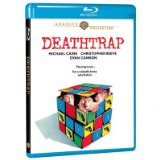| Reviews & Columns |
|
Reviews DVD TV on DVD Blu-ray 4K UHD International DVDs In Theaters Reviews by Studio Video Games Features Collector Series DVDs Easter Egg Database Interviews DVD Talk Radio Feature Articles Columns Anime Talk DVD Savant Horror DVDs The M.O.D. Squad Art House HD Talk Silent DVD
|
DVD Talk Forum |
|
|
| Resources |
|
DVD Price Search Customer Service #'s RCE Info Links |
|
Columns
|
|
|
Deathtrap: Warner Archive Collection
Warner Bros. // Unrated // November 20, 2012
List Price: $19.95 [Buy now and save at Wbshop]
The Film:
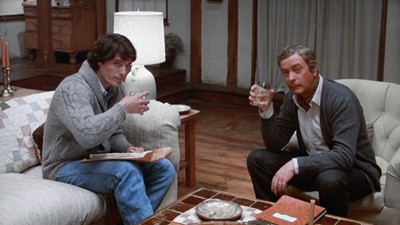 The decadently baroque Deathtrap falls into the class of mystery that isn't easy to discuss without blowing the lid off its twisted little secrets, and I certainly wouldn't want to do that. The urge is there to reveal exactly where certain performances excel and where this parlor thriller's elaborateness transforms into a clever little contraption, yet that wouldn't be fair to the cunning of Ira Levin's play -- or to Sidney Lumet's doting adaptation. Motives evolve, courses change, voices elevate, and the threat of death hangs in the air of a moody Long Island cottage, where stunted creative ambition and hubris loom over a once-successful playwright and his devious plotting. This is a pitch-black comedy, through and through, an ode to Anthony Shaffer's Sleuth that more ornately blurs the line between macabre humor and soup-thick tension, and it's that puzzlement over how to follow the film's tone that underscores its modest, masterminded success.
The decadently baroque Deathtrap falls into the class of mystery that isn't easy to discuss without blowing the lid off its twisted little secrets, and I certainly wouldn't want to do that. The urge is there to reveal exactly where certain performances excel and where this parlor thriller's elaborateness transforms into a clever little contraption, yet that wouldn't be fair to the cunning of Ira Levin's play -- or to Sidney Lumet's doting adaptation. Motives evolve, courses change, voices elevate, and the threat of death hangs in the air of a moody Long Island cottage, where stunted creative ambition and hubris loom over a once-successful playwright and his devious plotting. This is a pitch-black comedy, through and through, an ode to Anthony Shaffer's Sleuth that more ornately blurs the line between macabre humor and soup-thick tension, and it's that puzzlement over how to follow the film's tone that underscores its modest, masterminded success.
Sidney Bruhl's (Michael Caine) name once commanded recognition as a chief player on the Broadway theatrical scene, due to his inventive comedy-mysteries. His latest, though, is yet another disastrous flop in the long list following his initial success, leaving the crowd either whispering insults or stunned in deafening silence. In his frustration, Sidney returns to his secluded cottage -- and to his wealthy, pill-popping, anxious wife, Myra (Dyan Cannon) -- to lament in his failure as writer, and, in contrast, to marvel at the excellence of an amateur screenplay sent to him by someone who attended one of his stage-writing seminars. The idea started out as something of a joke: what if he were to simply ... kill this nearly-nameless screenwriter, Clifford Anderson (Christopher Reeve), and pilfer his suspense-thriller script, entitled "Deathtrap", for use as his own work? Myra initially dismisses Sidney's plan as a jest, but when he invites the young writer over to their house for discussion about his work, the suspicion begins.
Aside from the opening theater scene and one or two exterior shots, Deathtrap takes place completely between the walls of the Bruhl cottage: a rustic, spacious location, adorned with maces and crossbows on the dark-wood walls of Sidney's workspace and a decidedly-'80s pink glow radiating behind a brick chimney. Sidney Lumet preserves a theatrical presence to the film's bustle of activity, complete with several lengthy long-takes and the occasional shot that pulls back to reveal the full spread of the household. At first, Lumet -- and, by extension, Ira Levin -- lure the audience into the assumption that money doesn't factor into Sidney's motives; between the house and Myra's wealth, his scheming appears to be purely for prestige's sake. Yet, that's all part of the clever house of cards assembled, preying on assumptions over incentive and temperament as the fateful evening of Clifford's creative session approaches, not unlike a fusion of Sleuth, Rope, and Lumet's own 12 Angry Men.
As soon as Clifford steps into the cottage, revealing the statuesque physique of Christopher Reeve -- Superman, essentially, in the eyes of the audience -- the scheme's complexity and motivations are flipped on their head. Adapted by Jay Presson Allen, Deathtrap's script operates under a highly-theatrical presence from thereon out, bleeding together devious situational comedy and legitimate anticipation in seeing what Sidney -- and Myra -- will do in the face of murder for the sake of creative pursuit. There's no denying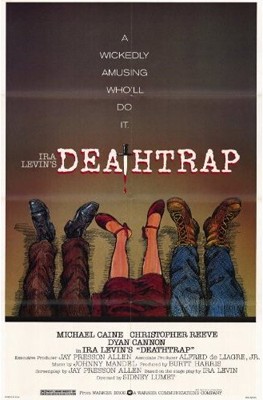 the bleakness of the comedy, yet it dominates the film's tone to a degree that prevents Lumet's film from generating many hearty "laughs"; he allows the camera to focus on body language, facial gestures, and the wideness of eyes in a way that interlocks surreal, deadpan humor with an ominous atmosphere. Dyan Cannon's timing remains especially on-point as Sidney's frazzled wife, whose constant suspicion over whether her husband is capable of murder creates an infectious persona.
the bleakness of the comedy, yet it dominates the film's tone to a degree that prevents Lumet's film from generating many hearty "laughs"; he allows the camera to focus on body language, facial gestures, and the wideness of eyes in a way that interlocks surreal, deadpan humor with an ominous atmosphere. Dyan Cannon's timing remains especially on-point as Sidney's frazzled wife, whose constant suspicion over whether her husband is capable of murder creates an infectious persona.
Lumet understands that a big part of Deathtrap focuses on characters evaluating and reevaluating one another in covert ways, dictated by the suspicion that mounts as Clifford picks up on more and more of what's happening around him. Michael Caine is well-conditioned to these mechanics, and it shows; his nimble shifts in deviance and honesty from Sleuth are shadowed here as Sidney Bruhl, embodying a conflicted, earnest, yet self-seeking artist who very well could kill or not kill the focus of his scheme. But, man, does Christopher Reeve work some magic as Clifford. Somewhere in Time suggested that there's more to the actor than his superhero counterpart, but his shifts in method as Clifford -- from innocence and misgiving to eventual intimidation -- create this rather versatile presence that'll take one by surprise. The rapport between the two isn't like that of Laurence Olivier and Caine, instead more sinister and authoritative with how the story's motives unravel, yet their chemistry still becomes thoroughly absorbing in the process.
The elaborateness of Ira Levin's play doesn't stop for a second, even as it becomes a bit preposterous, where the twists-'n-turns in the Bruhl's home runs flush against the script for Clifford's play in a witty parallel. While scenes involving a clairvoyant neighbor and an estate lawyer also add elements of contrivance to the sake of ornate suspense, and they're not without their frustrations due to easy dubiousness, the marks they leave on Sidney's grand scheme -- both before and after the events of that night -- sustain a confidently impish attitude that makes up for it. Deathtrap's cascade of climaxes and motivations blends menacing theatricality with quick-witted verbal barbs, where lavish stretches of exposition and unresolved red herrings are underscored by Lumet's alert direction throughout its grand climax. And when the curtain's pulled back on the truth behind what's been seen, Lumet's vision of the play delivers a zealous side-stab that revels in the equilibrium between dishonesty and misfortune. Vague, I know, but I wouldn't want to spoil its surprises.
The Blu-ray:
And now for something a little different: Warner's Archive Collection have spearheaded an initiative for Blu-ray presentations on demand, and Deathtrap marks one of the first to come out of the woodwork. For most intents and purposes, the presentation aesthetically looks like any other WB catalog release, arriving in one of the sturdier eco-friendly cases and sporting original poster artwork on both the cover and the disc.
Video and Audio:
If this is any indication of what's to come from Warner's Archive Collection, then we're hopefully in for a run of suitable high-definition offerings.
Deathtrap creeps its way onto Blu-ray in a 1.78:1-framed 1080p treatment that largely, despite a few flaws, looks modestly impressive. A lot of opportunity for fine detail representation appears in the photography's movement around the cottage: wood-grain and brick textures, cords and patterns in clothing, as well as focused close-ups that capture tightly-zoomed skin and hair. Around most corners, the disc impressed with its rather sharp capability; Reeve's sweaters, Caine's hair, and the visual complexity of Sidney's office respectfully and naturally project their appeal. Contrast largely presents inky blacks that don't swallow up details, only showcasing some noise at certain points, while the palette -- rich wood browns and off-white shades in the architecture, radiance of neon-pink lighting, and the presence of flesh tones -- are pretty darn impressive. It's not perfect: a smooth, processed appearance does limit the image's effectiveness in a few instances, while grain can be somewhat unstable and digital in appearance and some print damage can be spotted. Altogether, though, Deathtrap looks really, really good.
Deathtrap's 2-channel mono Master Audio track isn't too shabby, either. The sounds populating Sidney Bruhl's cottage can be more engaging that one might expect: the splash of liquor in a glass, the click-clack of a typewriter, and the and the slamming of a wood door against its frame sound natural, all balanced pretty well against the parlor-style harpsichord and flute flourishes in Johnny Mandel's music. Of course, dialogue becomes the central feature of this play-centered film, which Warner's disc finds a suitable center among the different vocal registries; the banter between Michael Caine and Christopher Reeve find a pleasant-enough center in smooth middle-low tones, while Dyan Cannon and Irene Worth's higher-pitched dialogue hit their points with little distortion and a decent grasp on natural bass. Sure, the track suffers a bit from its age, occasionally sound a bit thin and raspy in a few parts, but the clarity sustains itself quite well for the film's purposes and age.
Special Features:
As to be expected, we've only got a brief, somewhat rough-quality Trailer (:54).
Final Thoughts:
Murder-mysteries that take place within the space of one location can be a lot of fun to watch unfold, and Deathtrap's pitch-black humor and unnerving atmosphere fits comfortably inside the genre. Adapted from Ira Levin's play and elevated by bold, often surprising performances -- especially in Christopher Reeve's versatility -- Sidney Lumet executes the numerous twists with a deft hand, while the high-reaching theatrics create an intense and often unpredictably game of wits in the space of a cozy cottage. Flickers of other parlor thrillers, even flints of 12 Angry Men, can be found in this darkly-comedic thriller, one not without flaws -- long-winded exposition and some superfluous plotting -- but quite gripping nevertheless. The more important thing here is that Warner's Archive Collection has established fairly firm footing in this presentation, with a pleasing transfer of the colorful, textured photography and the dialogue-rich audio track. Strongly Recommended.
Thomas Spurlin, Staff Reviewer -- DVDTalk Reviews | Personal Blog/Site
 The decadently baroque Deathtrap falls into the class of mystery that isn't easy to discuss without blowing the lid off its twisted little secrets, and I certainly wouldn't want to do that. The urge is there to reveal exactly where certain performances excel and where this parlor thriller's elaborateness transforms into a clever little contraption, yet that wouldn't be fair to the cunning of Ira Levin's play -- or to Sidney Lumet's doting adaptation. Motives evolve, courses change, voices elevate, and the threat of death hangs in the air of a moody Long Island cottage, where stunted creative ambition and hubris loom over a once-successful playwright and his devious plotting. This is a pitch-black comedy, through and through, an ode to Anthony Shaffer's Sleuth that more ornately blurs the line between macabre humor and soup-thick tension, and it's that puzzlement over how to follow the film's tone that underscores its modest, masterminded success.
The decadently baroque Deathtrap falls into the class of mystery that isn't easy to discuss without blowing the lid off its twisted little secrets, and I certainly wouldn't want to do that. The urge is there to reveal exactly where certain performances excel and where this parlor thriller's elaborateness transforms into a clever little contraption, yet that wouldn't be fair to the cunning of Ira Levin's play -- or to Sidney Lumet's doting adaptation. Motives evolve, courses change, voices elevate, and the threat of death hangs in the air of a moody Long Island cottage, where stunted creative ambition and hubris loom over a once-successful playwright and his devious plotting. This is a pitch-black comedy, through and through, an ode to Anthony Shaffer's Sleuth that more ornately blurs the line between macabre humor and soup-thick tension, and it's that puzzlement over how to follow the film's tone that underscores its modest, masterminded success. Sidney Bruhl's (Michael Caine) name once commanded recognition as a chief player on the Broadway theatrical scene, due to his inventive comedy-mysteries. His latest, though, is yet another disastrous flop in the long list following his initial success, leaving the crowd either whispering insults or stunned in deafening silence. In his frustration, Sidney returns to his secluded cottage -- and to his wealthy, pill-popping, anxious wife, Myra (Dyan Cannon) -- to lament in his failure as writer, and, in contrast, to marvel at the excellence of an amateur screenplay sent to him by someone who attended one of his stage-writing seminars. The idea started out as something of a joke: what if he were to simply ... kill this nearly-nameless screenwriter, Clifford Anderson (Christopher Reeve), and pilfer his suspense-thriller script, entitled "Deathtrap", for use as his own work? Myra initially dismisses Sidney's plan as a jest, but when he invites the young writer over to their house for discussion about his work, the suspicion begins.
Aside from the opening theater scene and one or two exterior shots, Deathtrap takes place completely between the walls of the Bruhl cottage: a rustic, spacious location, adorned with maces and crossbows on the dark-wood walls of Sidney's workspace and a decidedly-'80s pink glow radiating behind a brick chimney. Sidney Lumet preserves a theatrical presence to the film's bustle of activity, complete with several lengthy long-takes and the occasional shot that pulls back to reveal the full spread of the household. At first, Lumet -- and, by extension, Ira Levin -- lure the audience into the assumption that money doesn't factor into Sidney's motives; between the house and Myra's wealth, his scheming appears to be purely for prestige's sake. Yet, that's all part of the clever house of cards assembled, preying on assumptions over incentive and temperament as the fateful evening of Clifford's creative session approaches, not unlike a fusion of Sleuth, Rope, and Lumet's own 12 Angry Men.
As soon as Clifford steps into the cottage, revealing the statuesque physique of Christopher Reeve -- Superman, essentially, in the eyes of the audience -- the scheme's complexity and motivations are flipped on their head. Adapted by Jay Presson Allen, Deathtrap's script operates under a highly-theatrical presence from thereon out, bleeding together devious situational comedy and legitimate anticipation in seeing what Sidney -- and Myra -- will do in the face of murder for the sake of creative pursuit. There's no denying
 the bleakness of the comedy, yet it dominates the film's tone to a degree that prevents Lumet's film from generating many hearty "laughs"; he allows the camera to focus on body language, facial gestures, and the wideness of eyes in a way that interlocks surreal, deadpan humor with an ominous atmosphere. Dyan Cannon's timing remains especially on-point as Sidney's frazzled wife, whose constant suspicion over whether her husband is capable of murder creates an infectious persona.
the bleakness of the comedy, yet it dominates the film's tone to a degree that prevents Lumet's film from generating many hearty "laughs"; he allows the camera to focus on body language, facial gestures, and the wideness of eyes in a way that interlocks surreal, deadpan humor with an ominous atmosphere. Dyan Cannon's timing remains especially on-point as Sidney's frazzled wife, whose constant suspicion over whether her husband is capable of murder creates an infectious persona. Lumet understands that a big part of Deathtrap focuses on characters evaluating and reevaluating one another in covert ways, dictated by the suspicion that mounts as Clifford picks up on more and more of what's happening around him. Michael Caine is well-conditioned to these mechanics, and it shows; his nimble shifts in deviance and honesty from Sleuth are shadowed here as Sidney Bruhl, embodying a conflicted, earnest, yet self-seeking artist who very well could kill or not kill the focus of his scheme. But, man, does Christopher Reeve work some magic as Clifford. Somewhere in Time suggested that there's more to the actor than his superhero counterpart, but his shifts in method as Clifford -- from innocence and misgiving to eventual intimidation -- create this rather versatile presence that'll take one by surprise. The rapport between the two isn't like that of Laurence Olivier and Caine, instead more sinister and authoritative with how the story's motives unravel, yet their chemistry still becomes thoroughly absorbing in the process.
The elaborateness of Ira Levin's play doesn't stop for a second, even as it becomes a bit preposterous, where the twists-'n-turns in the Bruhl's home runs flush against the script for Clifford's play in a witty parallel. While scenes involving a clairvoyant neighbor and an estate lawyer also add elements of contrivance to the sake of ornate suspense, and they're not without their frustrations due to easy dubiousness, the marks they leave on Sidney's grand scheme -- both before and after the events of that night -- sustain a confidently impish attitude that makes up for it. Deathtrap's cascade of climaxes and motivations blends menacing theatricality with quick-witted verbal barbs, where lavish stretches of exposition and unresolved red herrings are underscored by Lumet's alert direction throughout its grand climax. And when the curtain's pulled back on the truth behind what's been seen, Lumet's vision of the play delivers a zealous side-stab that revels in the equilibrium between dishonesty and misfortune. Vague, I know, but I wouldn't want to spoil its surprises.
The Blu-ray:
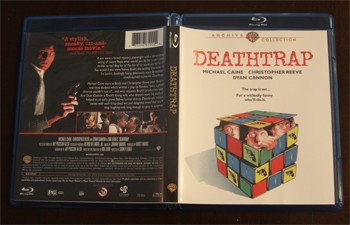 | 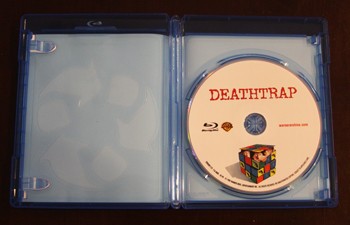 |
And now for something a little different: Warner's Archive Collection have spearheaded an initiative for Blu-ray presentations on demand, and Deathtrap marks one of the first to come out of the woodwork. For most intents and purposes, the presentation aesthetically looks like any other WB catalog release, arriving in one of the sturdier eco-friendly cases and sporting original poster artwork on both the cover and the disc.
Video and Audio:
If this is any indication of what's to come from Warner's Archive Collection, then we're hopefully in for a run of suitable high-definition offerings.
Deathtrap creeps its way onto Blu-ray in a 1.78:1-framed 1080p treatment that largely, despite a few flaws, looks modestly impressive. A lot of opportunity for fine detail representation appears in the photography's movement around the cottage: wood-grain and brick textures, cords and patterns in clothing, as well as focused close-ups that capture tightly-zoomed skin and hair. Around most corners, the disc impressed with its rather sharp capability; Reeve's sweaters, Caine's hair, and the visual complexity of Sidney's office respectfully and naturally project their appeal. Contrast largely presents inky blacks that don't swallow up details, only showcasing some noise at certain points, while the palette -- rich wood browns and off-white shades in the architecture, radiance of neon-pink lighting, and the presence of flesh tones -- are pretty darn impressive. It's not perfect: a smooth, processed appearance does limit the image's effectiveness in a few instances, while grain can be somewhat unstable and digital in appearance and some print damage can be spotted. Altogether, though, Deathtrap looks really, really good.
Deathtrap's 2-channel mono Master Audio track isn't too shabby, either. The sounds populating Sidney Bruhl's cottage can be more engaging that one might expect: the splash of liquor in a glass, the click-clack of a typewriter, and the and the slamming of a wood door against its frame sound natural, all balanced pretty well against the parlor-style harpsichord and flute flourishes in Johnny Mandel's music. Of course, dialogue becomes the central feature of this play-centered film, which Warner's disc finds a suitable center among the different vocal registries; the banter between Michael Caine and Christopher Reeve find a pleasant-enough center in smooth middle-low tones, while Dyan Cannon and Irene Worth's higher-pitched dialogue hit their points with little distortion and a decent grasp on natural bass. Sure, the track suffers a bit from its age, occasionally sound a bit thin and raspy in a few parts, but the clarity sustains itself quite well for the film's purposes and age.
Special Features:
As to be expected, we've only got a brief, somewhat rough-quality Trailer (:54).
Final Thoughts:
Murder-mysteries that take place within the space of one location can be a lot of fun to watch unfold, and Deathtrap's pitch-black humor and unnerving atmosphere fits comfortably inside the genre. Adapted from Ira Levin's play and elevated by bold, often surprising performances -- especially in Christopher Reeve's versatility -- Sidney Lumet executes the numerous twists with a deft hand, while the high-reaching theatrics create an intense and often unpredictably game of wits in the space of a cozy cottage. Flickers of other parlor thrillers, even flints of 12 Angry Men, can be found in this darkly-comedic thriller, one not without flaws -- long-winded exposition and some superfluous plotting -- but quite gripping nevertheless. The more important thing here is that Warner's Archive Collection has established fairly firm footing in this presentation, with a pleasing transfer of the colorful, textured photography and the dialogue-rich audio track. Strongly Recommended.
|
| Popular Reviews |
| Sponsored Links |
|
|
| Sponsored Links |
|
|
| Release List | Reviews | Shop | Newsletter | Forum | DVD Giveaways | Blu-Ray | Advertise |
|
Copyright 2024 DVDTalk.com All Rights Reserved. Legal Info, Privacy Policy, Terms of Use,
Manage Preferences,
Your Privacy Choices | |||||||









